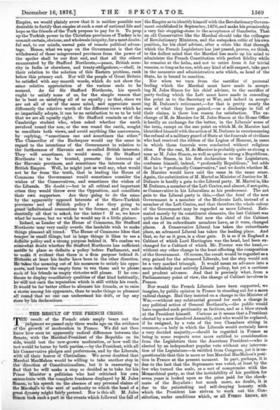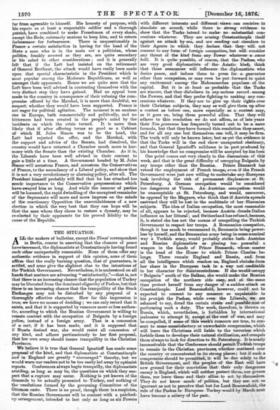know how soon an apparently radidal difference between the a
very decided majority,—should be regarded in France as Senate, with the Marshal-President of the Republic on its being in some respects even more entitled to consideration side, would test the new-grown moderation, or how well the from the Legislature than the American President—who is Marshal MacMahon would be willing to take another step in tion in France at the present moment. In part, perhaps, it is the direction of Constitutionalism, but it is reassuring to due to the fact that the Septennate was voted, at least by the find that he will make a step so decided as to take for his few who turned the scale, as a sort of compromise with the Prime Minister a politician who had criticised his own Monarchical party, so that the inviolability of his position for antecedents with the complete frankness displayed by M. Jules seven years is looked upon as the price paid for the check- Simon, in his speech on the absence of any personal claims of mate of the Royalists ; but much more, no doubt, it is the Marshal's to the sort of authority to which the head of a due to the painstaking and self-denying honesty with great dynasty might fairly pretend. Nor is this all. M. Jules which the President has striven to work out the Con- Simon took such a part in the events which followed the fall of stitution, under conditions which, as all France knows, are Empire we would plainly avow that it is neither possible nor the Empire as to identify himself with the Revolutionary Govern- desimble to fortify that empire at such a cost of national life and ment established in September, 1870, and make his premiership hope as the friends of the Turk propose to pay for it. To prop a very fair stepping-stone to the acceptance of Gambetta. That up the Turkish power in the Christian provinces of Turkey is to an old Conservative like the Marshal should take the colleague commit certain, obvious, and wholesale iniquity, for a most doubt- of Revolutionary Ministers, and the outspoken critic of his own ful and, to our minds, unreal gain of remote political advan- position, for his chief adviser, after a crisis like that through tage. Hence, what we urge on the Government is that the which the French Legislature has just passed, proves, we think, withdrawal of these misgoverned provinces from the power of to the dullest mind that the Marshal has made up his mind to the spoiler shall be our first end, and that all the others administer the French Constitution with perfect fidelity while enumerated by Sir Stafford Northcote,—peace, British sem- he remains at the helm, and not to retire from it for trivial rity in India or elsewhere, and treaty-obligations,—shall, in reasons, so long as he can, with any kind of self-respect, take part their relation to the solution of this Eastern problem, rank in the measures and administrative acts which, as head of the below this piimary end. Nor will the people of Great Britain State, he is bound to sanction.
be satisfied with any smooth words, which do not show the Nor when we turn from the sacrifice of personal same relative appreciation of the various ends to be feeling which the Marshal must have made in accept- secured. As for Sir Stafford Northcote, his speech ing M. Jules Simon for his chief adviser, to the sacrifice of ought to satisfy none of us, for the simple reason that party feeling which the Left must have made in conceding he is bent on satisfying all of us equally ; so that, since we the point as to the Secretary at War, and indeed in accept- are not all of us of the same mind, and appreciate most ing M. Dufaure's retirement,—for that is pretty nearly the differently the relative worth of the different views which he sum of what they have gained,—as a discharge in full of so impartially adopts, it can be no satisfaction to us to be told their claims, is there less reason for satisfaction. The ex- that we are all equally right. • Sir Stafford reminds us of the change of M. de Marcere for M. Jules Simon at the Home Office Cambridge student who, when asked whether the earth is hardly an exchange for the better, in the Liberals' sense of revolved round the sun, or the sun round the earth, sought the term, except on the one point on which M. de Marcere had to conciliate both views, and avoid anything like narrowness, identified himself with the action of M. Dufaure in countenancing by replying, " sometimes one and sometimes the other." the refusal of a military guard of State at the funerals of civilians The Chancellor of the Exchequer would say the same in who had received the ribbon of the Legion of Honour, in cases regard to the intentions of the Government in relation to in which those funerals were conducted without religious the furtherance of Slavonic and so-called British interests. rites. For the rest, M. de Maniere is probably quite as strong a They will sometimes, it would seem, if Sir Stafford man as M. Jules Simon, as well as quite as strong a Republican. Northcote is to be trusted, promote the interests of M. Jules Simon, in his first declaration to the Legislature, the Slavonic provinces, and sometimes the interests of the confesses himself, indeed, " profoundly Republican," but adds British Empire. Well, he might just as well say, what would that he is "profoundly Conservative," and we doubt whether M. not be far from the truth, that in leading the House of de Marcere would have said the same in the same sense. Commons the Government would sometimes consider the Again, the substitution of M. Martel as Minister of Justice for M. wishes of the Conservatives, and sometimes the wishes of Dufaure is hardly a gain to the Liberal party. M. Martel is, like the Liberals. No doubt ;—but in all critical and important M. Dufaure, a member of the Left Centre, and almost, if notquite, crises they would throw over the Opposition, and conciliate as Conservative in his Liberalism as his predecessor. The net their own supporters. Are they going to do the same gain to the Liberal party is this,—that the head of the new by the apparently opposed interests of the SLavo-Turkish Government is a member of the Moderate Left, instead of a provinces and of British policy Are they going to member of the Left Centre, and that therefore the whole colour grant infinitesimal concessions to the former, and give sub- of the Government may be regarded as more Liberal. Esti- stantially all that is asked, for the latter If so, we know mated merely by its constituent elements, the last Cabinet was what he means but we wish he would say it a little plainer. quite as Liberal as this. But now the chief of the Cabinet Leader of the House of Commons, Sir Stafford and one of its subordinate members have, as it were, changed Northcote may very easily overdo the laudable wish to make places. A Conservative Liberal has taken the subordinate things pleasant all round. The House of Commons likes that place, an advanced Liberal has taken the leading place. And teinper, in small tfiings, but in large things it likes to see a that, so far as it goes, is a clear gain. It is as if in England a definite policy and a strong purpose behind it. We confess we Cabinet of which Lord Hartington was the head, had been ex- soMewhat doubt whether Sir Stafford Northcote has sufficient changed for a Cabinet of which Mr. Forster was the head,— mettle to place so definite a polity before Parliament, and without any other change in the least affecting the composition to -make it evident that there is a firm purpose behind it. of the Government. Of course, the result would be regarded as a Hitherto at least his faults have been in the other direction, step gained for the advanced Liberals, but the step would not Pbakes the meaning out of his measures to satisfy his oppo- be a very marked triumph. It would mean an advance into a iiente, and leaves the empty form to vex them and to please more definitely and actively Liberal policy, but yet a cautious such-of his friends as empty victories will please. If he con- and prudent advance. And that is precisely what, from a i any political action of General Berthaut's,—the public would have regarded such pertinacity as factious, and as a blow struck posi- far from agreeable to himself. His honesty of purpose, with his repute as at least a respectable soldier and a thorough patriot, have combined to make Frenchmen of every shade, except the Reds, extremely anxious to keep him, and to return forbearance- for forbearance. There is unquestionably in France- a certain satisfaction in having for the head of the State a man who is in the main not a politician, whose politics, frankly avowed as they are, are quite secondary in- his mind to other considerations ; and it is generally felt that if the Left had insisted on the retirement of General Berthant, the attack would have really been made upon- that special characteristic in the President which is most popular among the Moderate Republicans, as well as amongst their opponents. Hence we are quite sure that the Left have been well advised in contenting themselves with the very-distinct step they have gained. Had an appeal been made be-the country in consequence of their refusing the com- promise offered by the Marshal, it is more than doubtful, we suspect, whether they would have been supported. France is not eager for political agitation. The moment is an anxious one in Europe, both commercially and politically, and no bitterness had been created in the people's mind by the incidents on which the crisis turned. It is more than likely that if after offering terms so good as a Cabinet of which M. Jules Simon was to be the head, the Left had rejected the offer, and the Marshal, with the support and advice of the Senate, had dissolved, the country would have returned a Chamber much more in har- mony with the Senate than the existing Chamber. As it is, the Liberals have been well advised in their content to gain- a little at a time. A Government headed by M. Jules Trmon-will accustom France, and accustom the Conservatives of Franoe, to the ascendancy of a Liberal policy, and show that it is not a very revolutionary or alarming policy, after all. The President himself probably will find that he has attached too muck- importance to the Conservative prepossessions which have,svrayed him so long. And while the rancour of parties will be-lessened, the rapid dwindling of the unexpired remainder of the- Septennate will more and more impress on the minds of the- reactionary Opposition the unavoidableness of a new election in which the very best that they can hope will be that the man whom they choss to restore a dynasty, may be re-elected by their opponents for his proved fidelity to the cause-of the Republic.



































 Previous page
Previous page